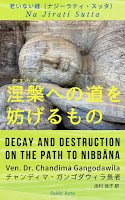私たちの心は、なぜ汚れてしまうのでしょうか? なぜ妄想するのでしょうか? 妄想はどのように起こるのでしょうか? 妄想と思考、煩悩との関係は? チャンディマ・ガンゴダウィラ長老(著)日本語版『妄想の対処法:認識プロセスを観察し、妄想ループを絶ち切る(蜜丸経)』の原著改訂版。改訂版では、妄想の仕組み、妄想と煩悩との関係などが、さらに深く掘り下げられ、わかりやすく解説されています。
Papañca is one of the most helpful Theravāda Buddhist teachings used to understand how our thoughts become impure and the most compelling account of this subject is the Madhupiṇḍika Sutta. Since many writers don't utilize papañca when alluding to defilements, many readers discover the setting of mental purification hard to understand. If we seriously want to learn how to keep our mental purification unadulterated from defilements, we should figure out how the mental purification can be tainted through papañca.
■ Contents
Introduction
What is Papañca?
Papañca (the process of Mental Proliferation)
Understanding the connection between Papañca and Kilesa / Upakkilesa
1. Abhijjā - visamalobha
2. Byāpada (vyāpāda)
3. Kodha
4. Upanāha
5. Makkha
6. Palāsa
a) Choose when to engage, and on what topics
b) Depersonalize the situation
c) Focus attention on the palāsin
d) Remain calm and composed
e) Turn reactions into constructive and probing pro-actions
f) Think ahead to avoid traps
7. Issā
8. Macchariya
9. Māyā
10. Sātheyya
11. Thambha
12. Sārambha
13. Māna
14. Atimāna
15. Mada
16. Pamāda
The contents of Papañca: Taṇhā, Māna and Diṭṭhi
Papañcasaññāsankhā and Vipallāsa
The difference between Saññā and Abhiññā
Transforming the Mind from Mental Proliferation into Mental Non-Proliferation means taking care of the Mind
Conclusion
Bibliography
About the Author
■ About the Author
VEN. DR. CHANDIMA GANGODAWILA, a Canadian Buddhist monk, is the Senior Advisor to Paṭisota.
In 2015 he earned a Ph.D. in Sanskrit from the University of Sri Jayewardenepura in Sri Lanka with his work, “ An Annotated Translation Into English Of Ratnamālāvadāna With A Critical Introduction ”. Majoring in Sanskrit and minoring in both Pali and Buddhist Philosophy, he earned a BA with First-Class Honours in 2008, receiving the Sri Soratha Gold Medal as the student with the highest marks in the Faculty of Humanities and Social Sciences at the University of Sri Jayewardenepura.
Recipient of the University of British Columbia Faculty of Arts Research Grant (2016-2017), Ven. Dr. Chandima has lectured in Sanskrit at the University of Victoria, British Columbia (BC); the University of Sri Jayewardenepura; and the Buddhist and Pali University of Sri Lanka. He served as Resident Buddhist monk at the Ottawa Theravada Buddhist Vihara (2018-2020), Alberta Buddhist Vihara Association (2016-2017), and at the Buddhist Vihara Society in BC (2011-2016), where he was also Principal of the Dhamma School. From 2012 to 2016, he served as Theravada Buddhist Chaplain at the University of British Columbia, Vancouver, and in 2016 was a Research Fellow at the Centre for Studies in Religion and Society of the University of Victoria, BC. He also collaborated at the Nagaoka National College of Technology in Nagaoka, Japan.
At his Paṭisota Blog (https://patisota.blogspot.com), he presents a fluent and articulate rendition of the original Pali Suttas and Abhidhamma, carefully striving to avoid anything that would blur or distort the words of the Buddha.






